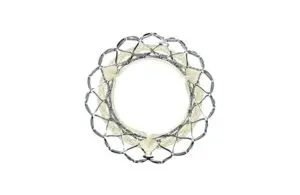
Findings from the Evolut Low-Risk trial demonstrated numerically better clinical outcomes for the Evolut TAVR system. It also showed significantly better hemodynamic valve performance compared to surgical aortic valve replacement (SAVR). The study evaluated a low-risk aortic stenosis (AS) patient population.
Medtronic presented data at the American College of Cardiology’s 72nd Annual Scientific Session Together with World Heart Federation’s World Congress of Cardiology. Results were published simultaneously in the Journal of the American College of Cardiology.
In a news release, Dr. John Forrest of the Yale School of Medicine called the need to understand the durability of TAVR “critical.”
“With an increasing number of younger, low-risk patients undergoing TAVR, there is a critical need to better understand the intermediate and longer-term durability of TAVR to aid in the shared decision making between patients and providers,” Forrest said. “These positive mid-term results from the Evolut Low-Risk trial add to the growing body of clinical evidence demonstrating the benefits of Evolut TAVR for a broad set of patients.”
How the Medtronic Evolut TAVR system stacks up
The prospective, randomized, multicenter, noninferiority study assessed Evolut’s safety and efficacy. It compared Evolut TAVR to SAVR in patients with a low predictive risk of 30-day surgical mortality. The study randomized patients to TAVR with a self-expanding, supra-annular CoreValve, Evolut R or PRO bioprosthesis, or SAVR.
Medtronic said a total of 1,414 patients underwent attempted implant (730 TAVR to 684 SAVR). Patients recorded a baseline mean age of 74 years.
Evolut TAVR showed a numerical benefit compared to surgery in terms of the study’s primary endpoint. The study observed all-cause mortality or disabling stroke at three years in 7.4% of Evolut patients compared to 10.4% of SAVR patients. Evolut patients also had less moderate or greater prosthesis-patient mismatch at three years (10.6% to 25.1%). This occurs when the valve is too small for the patient’s body size.
Medtronic said the findings support two-year data demonstrating the improved hemodynamic valve performance of supra-annular, self-expanding TAVR compared to surgery. The company just last week shared five-year data supporting its CoreValve Evolut TAVR system against SAVR.
“As Medtronic works to expand the benefits of TAVR to a broader patient population and empower physicians to deliver individualized lifetime care, the results of the Evolut Low-Risk Trial are an important milestone for our TAVR platform,” said Nina Goodheart, SVP and president of the Structural Heart & Aortic business at Medtronic. “These data add to the robust body of evidence demonstrating that the Evolut platform offers excellent valve performance and remains hemodynamically stable for years to come in younger, healthier patients.”

